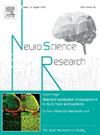The impact of sleep on the Th17/Treg axis and cytokine levels in patients with major depressive disorder
IF 2.3
4区 医学
Q3 NEUROSCIENCES
引用次数: 0
Abstract
A cross-sectional study was designed to investigate the relationship between immune parameters and sleep quality in patients with depression, in which 65 depression patients and 63 healthy controls were enrolled between August 2021 and June 2024, with sleep assessments ultimately completed by 59 depression patients following exclusions. Th17/Treg cell ratios and cytokine levels were measured using flow cytometry and cytometric bead array (CBA), and correlation and regression analyses were performed to evaluate associations between sleep quality and inflammatory markers. Elevated Th17 cells, Th17/Treg imbalance, and increased IL-6 and IL-17 levels were observed in depression patients compared to controls (all P < 0.0167), while higher IL-4, IL-6, and IL-17 levels were found in patients with sleep disorders (all P < 0.0071). Th17/Treg ratios were positively correlated with sleep disturbance scores, whereas Treg levels showed an inverse correlation, and IL-6, IL-17, IFN-γ, and TNF-α levels were positively associated with sleep disturbances (all P < 0.05). Furthermore, IL-6 and IFN-γ were identified as significant predictors of poor sleep quality (all P < 0.05). These findings suggest that inflammatory dysregulation, particularly elevated IL-6 and IFN-γ, is associated with poorer sleep quality in depression patients, providing potential insights for enhanced clinical management.
睡眠对重度抑郁症患者Th17/Treg轴和细胞因子水平的影响
一项横断面研究旨在调查抑郁症患者免疫参数与睡眠质量之间的关系,该研究在2021年8月至2024年6月期间招募了65名抑郁症患者和63名健康对照者,最终对59名抑郁症患者进行了排除后的睡眠评估。采用流式细胞术和细胞头阵列(CBA)测量Th17/Treg细胞比率和细胞因子水平,并进行相关和回归分析以评估睡眠质量与炎症标志物之间的相关性。与对照组相比,抑郁症患者Th17细胞升高,Th17/Treg失衡,IL-6和IL-17水平升高(均P < 0.0167),而睡眠障碍患者IL-4、IL-6和IL-17水平升高(均P < 0.0071)。Th17/Treg比值与睡眠障碍评分呈正相关,Treg水平呈负相关,IL-6、IL-17、IFN-γ、TNF-α水平与睡眠障碍评分呈正相关(均P < 0.05)。此外,IL-6和IFN-γ被确定为睡眠质量差的重要预测因子(均P < 0.05)。这些发现表明,炎症失调,特别是IL-6和IFN-γ的升高,与抑郁症患者的睡眠质量较差有关,为加强临床管理提供了潜在的见解。
本文章由计算机程序翻译,如有差异,请以英文原文为准。
求助全文
约1分钟内获得全文
求助全文
来源期刊

Neuroscience Research
医学-神经科学
CiteScore
5.60
自引率
3.40%
发文量
136
审稿时长
28 days
期刊介绍:
The international journal publishing original full-length research articles, short communications, technical notes, and reviews on all aspects of neuroscience
Neuroscience Research is an international journal for high quality articles in all branches of neuroscience, from the molecular to the behavioral levels. The journal is published in collaboration with the Japan Neuroscience Society and is open to all contributors in the world.
 求助内容:
求助内容: 应助结果提醒方式:
应助结果提醒方式:


